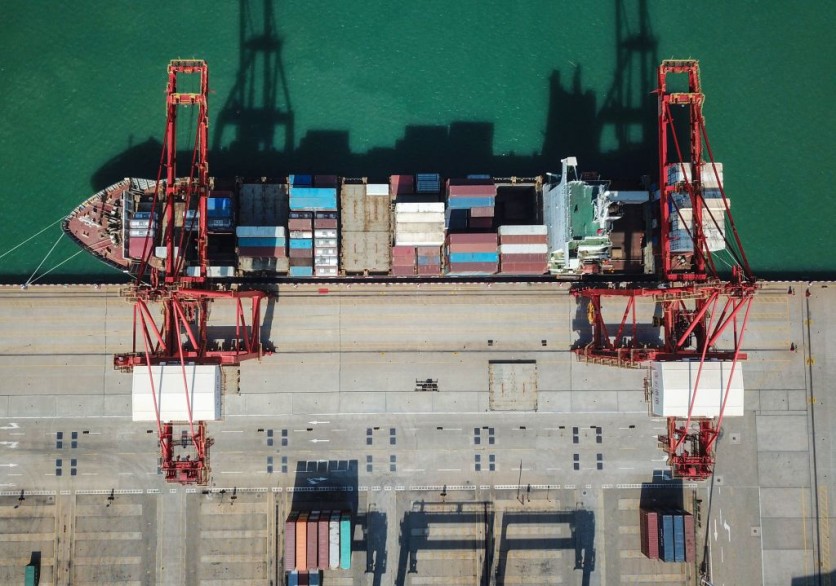Researchers from the University of Miami College of Engineering reportedly claim that utilizing massive cylinders for wind propulsion systems can reduce the reliance of cargo ships on fuel.
Scientists are working on creating massive cylinders to be installed on the decks of cargo vessels. These cylinders produce propulsion by drawing in air, increasing its pressure, and expelling it in another direction. Researchers say that ships could pass under bridges and move in and out of ports by lowering each cylinder.
GeCheng Zha, who is a professor of aerospace engineering and also leads the Aerodynamics and Computational Fluid Dynamics Lab at the university, maintains that in the current technological landscape, wind-assisted propulsion can serve as a viable substitute for diesel engines.

(Photo : STR/AFP via Getty Images)
This aerial photo taken on May 8, 2019 shows a cargo ship berthing at a port in Lianyungang in China's eastern Jiangsu province. - China's exports fell more than expected in April while imports rose, official data showed on May 8, ahead of high-stakes talks aimed at resolving a trade war with the United States.
The main advantage is its environmentally friendly nature, an effective way to decrease carbon emissions in the shipping industry, responsible for around 3% of global greenhouse gas emissions.
Zha, currently working on designing and simulating his wind-propulsion devices, mentioned that the cylinders could potentially cut fuel consumption by half on certain shipping routes.
In addition, this innovative system has the potential to decrease ship fuel costs by as much as 90% by utilizing stationary cylinders and eliminating moving parts.
Zha's nonrotating cylinders, created using co-flow jet technology like his aircraft research, are projected to be more efficient than current wind-assisted propulsion units on some cargo ships. At present, certain ships are utilizing wind-assisted propulsion systems.
Cargo Ships' Diesel Dependency
Currently, approximately 30 cargo ships from a total global fleet of around 60,000 are utilizing wind propulsion with rigid sails constructed from aluminum, fiberglass, and carbon fiber, which work alongside a ship's engines at a low power level. The London-based International Windship Association anticipates that the number will rise to almost 11,000 by the end of the current decade.
According to Zha, the shipping sector has been reluctant to change due to the strength of diesel engines, but the professor foresees a shift will be forced upon them, whether they like it or not.
China's Electric Container Ship
When it comes to reducing ships' reliance on fuel, China made a significant step in green transportation by unveiling the biggest fully electric container ship globally.
The ship, created and produced by the Chinese government-owned company China Ocean Shipping Group (Cosco), is currently running a fixed route between Shanghai and Nanjing in order to greatly decrease emissions during its trip.
The Greenwater 01, an electric container ship, is aiming to lead the way in the shipping industry. The eco-friendly propulsion system runs on batteries only, saving 3,900 kg (8,600 lb) of fuel for every 100 nautical miles sailed, transforming sustainable shipping.
Cosco emphasized on their social media platforms the potential for the ship to make a significant impact on reducing emissions throughout the year.
The company has also stated that Greenwater 01's first journey with no emissions, pollution, or noise has established a new standard for shifting the shipping sector towards the objectives of reduced carbon and eco-friendliness.
The Greenwater 01 holds multiple world records for its electric container ship technology. The ship stretches the limits of electric maritime transportation with its size, container, and battery capacity. With a main battery of over 50,000 kilowatt-hours, the ship has the capability to add extra battery packs for extended journeys.
Related Article : Yara Unveils World's First Clean Ammonia-Powered Container Ship

ⓒ 2026 TECHTIMES.com All rights reserved. Do not reproduce without permission.




